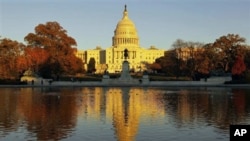Most political analysts agree the current U.S. Congress has been one of the most productive during the past century. Many experts fear, however, that the new Congress coming to Washington in January will be locked in partisan political battles, making it difficult for lawmakers to tackle the issues facing the country.
Democrats lost their majority in the House of Representatives in last month's midterm elections, which means Republican Representative John Boehner likely will replace Nancy Pelosi as the new speaker of the House. Democrats will hold on to a slim majority in the Senate, meaning that there will be a divided government, with Democratic President Barack Obama, a Republican-led House and a Democratic led-Senate.
Political experts generally agree the outgoing Congress will go down in history as one of the most prolific in terms of passing landmark legislation, including sweeping health care reform and a major reform of financial institutions on Wall Street.
Analyst Norman Ornstein of the American Enterprise Institute agrees. "Perhaps ironically, the 111th Congress is going to go down as one of the most productive in terms of its legislative accomplishments, their sweep and scope and breadth, certainly in our lifetimes and probably within the 20th century. This Congress, vilified by Americans in a broad way, most of them believing that nothing has been done, some believing that whatever was done was bad, but it ranks at least with the 89th Congress of the 'Great Society' of [former President] Lyndon Johnson."
Ornstein said voters punished Democratic incumbents in November because of high unemployment and because many Americans are in financial trouble. Moderates from both parties were voted out of office. Also, a large number of candidates affiliated with the conservative and libertarian Tea Party movement, which advocate tax and spending cuts and limited government, were voted in. One of them is incoming Republican Representative Tim Scott of South Carolina, who said the incoming freshmen class of congressmen will be a force for change.
"I mean, there is no doubt that when we show up with a class of 83 people - one third of the Republican conference - we have an opportunity to have a significant impact fairly quickly," said Scott.
Ornstein said the fact that moderate Democrats and moderate Republicans have been replaced by more strident new leaders means that the political climate in Washington likely will be more polarized and hostile.
"I have been in Washington for 41 years and immersed in the politics of Congress, and I have never seen it this bad," he said. "We've had plenty of times when we have had enormous tension - with the impeachment of President Nixon, we had the impeachment of President Clinton. We had the Vietnam War; we had the Iran-Contra investigation - periods when the two parties had an enormously high level of tension. But this is simply worse."
Political analyst David Hawkings of Congressional Quarterly magazine also has low expectations for the new Congress. He said the Republican-led House will have enormous power to challenge President Barack Obama.
"What the party in power can do, unchallenged from the other side, is oversight and holding the administration's feet to the fire," he said. "They have subpoena power; they can conduct a lot of investigations; they can have a lot of hearings where they call President Obama's aides and Cabinet members to the Hill and poke at them and criticize them for the cameras. And I think we will see a lot of that in the next two years, even if we do not see a lot of legislation enacted."
President Obama already has shown that he is willing to compromise with Republican lawmakers by agreeing to extend Bush-era tax cuts for all taxpayers, including the wealthiest Americans. But this angered fellow Democrats in the House, who said the president sacrificed core party principles. Analysts say the president likely will have to walk a fine line in trying to work with the new, divided Congress.
Experts Predict Partisan Clashes in New US Congress












